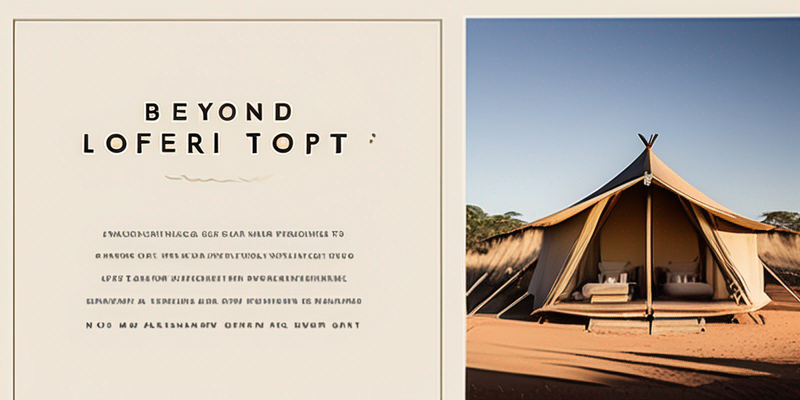The concept of the African safari has evolved dramatically from the colonial-era expeditions of Roosevelt and Hemingway. Today's discerning travelers seek not just wildlife encounters but transformative experiences that harmonize luxury with environmental responsibility. The modern safari lodge has become an architectural and experiential marvel—a place where the boundaries between wilderness immersion and refined comfort elegantly dissolve. Across Africa's most pristine landscapes, a new generation of safari properties is rewriting the definition of wilderness luxury. These extraordinary lodges don't merely provide a comfortable base for game drives; they create holistic sanctuaries where every element—from the architecture to the cuisine to the community engagement—reflects a profound respect for nature while delivering unprecedented levels of personalized service and sophisticated design.
Architectural Marvels in Untamed Settings
Marrakech:
The most innovative safari lodges are masterclasses in contextual design, where architecture serves as both frame and canvas for the wilderness beyond. At Singita Lebombo in South Africa's Kruger National Park, glass-walled suites seemingly float among the euphorbia trees, suspended like birds' nests above the N'wanetsi River. This bold departure from traditional safari aesthetics creates an exhilarating sense of immersion while maintaining an almost invisible ecological footprint.
Fez:
In Namibia's stark Sossusvlei region, andBeyond Sossusvlei Desert Lodge emerges from ancient lava formations like a mirage, its curved walls and floor-to-ceiling windows capturing the desert's ever-changing light. The lodge's celestial observatory and retractable bedroom skylights transform stargazing into a luxury amenity, allowing guests to fall asleep beneath the Southern Hemisphere's brilliant constellations.
Chefchaouen:
Rwanda's Bisate Lodge takes architectural integration even further with its spherical, thatched pods that echo both the volcanic landscape and traditional Rwandan building techniques. These dramatic structures, perched on the slopes of an eroded volcanic cone, offer panoramic views of Volcanoes National Park while serving as living showcases for indigenous craftsmanship and materials.
Culinary Excellence in Remote Wilderness
To truly experience Morocco, dive into its rich culture. Here are some highlights:
Culinary Classes:
The gastronomic revolution transforming safari lodges represents perhaps the most remarkable elevation of the wilderness experience. Far from the basic camp fare of yesteryear, today's premier lodges employ world-class chefs who create sophisticated menus using locally sourced ingredients, often from on-site organic gardens.
Music Festivals:
At Royal Malewane in South Africa's Greater Kruger region, executive chefs prepare personalized tasting menus paired with rare South African vintages from the lodge's extensive cellar. Dining venues change nightly—from lantern-lit bomas to surprise bush breakfasts set up beside hippo pools—ensuring that culinary experiences remain as memorable as wildlife sightings.
Artisanal Workshops:
Tanzania's Asilia Jabali Ridge takes the farm-to-table concept to new heights with its "wilderness kitchen" philosophy. Chefs work with nearby communities to source indigenous ingredients, transforming local Tanzanian staples into refined dishes that tell the story of the landscape. This approach not only creates exceptional dining experiences but also supports sustainable agricultural practices and preserves traditional food knowledge.
Wellness Frontiers: Spa Experiences in the Wild
Plan your visit around one of Morocco's vibrant festivals to experience the culture at its best:
Marrakech International Film Festival:
The integration of world-class wellness facilities into remote wilderness settings represents one of luxury safari's most significant evolutions. Today's premier lodges recognize that physical restoration is the perfect complement to the spiritual renewal that wilderness provides.
Fez Festival of World Sacred Music:
Zambia's Royal Chundu, situated on a private stretch of the Zambezi River, pioneered the concept of "bush spa synchronicity"—treatments timed to natural rhythms and incorporating indigenous ingredients. Their signature experience begins with a sunrise meditation on a private island, followed by a massage using oils infused with mongongo nuts harvested by local communities, culminating in a sound bath performed with traditional instruments as the sun sets.
Gnaoua World Music Festival:
Kenya's Segera Retreat in Laikipia has elevated the wellness concept further with its Rasul steam tower and solar-heated saltwater pool positioned to maximize views of Mount Kenya. Their wellness program integrates traditional Maasai healing practices with contemporary techniques, creating treatments that connect guests to the land's ancient wisdom while providing state-of-the-art therapeutic benefits.
Conservation as the Ultimate Luxury
Traveling sustainably ensures that Morocco's beauty is preserved for future generations. Here are some tips:
- What truly distinguishes the world's finest safari lodges is their commitment to conservation as the foundation of luxury. These properties understand that preserving pristine wilderness and supporting biodiversity represent the most valuable offering they can provide to discerning travelers.
- Wilderness Safaris' Mombo Camp in Botswana's Okavango Delta exemplifies this ethos. While guests enjoy copper bathtubs and private plunge pools, the lodge's primary investment is in rhino reintroduction programs and predator research that has helped restore the area's ecological balance. Guests participate in this mission through dedicated conservation experiences, from collaring expeditions with researchers to community visits that showcase how tourism directly funds education and healthcare initiatives.
- In Kenya's Masai Mara, Cottar's 1920s Safari Camp operates its own 7,608-acre conservancy that provides a crucial wildlife corridor while supporting sustainable grazing for Maasai communities. The camp's Conservation Trust has pioneered innovative funding mechanisms that allow guests to directly contribute to conservation outcomes, creating a model where luxury tourism directly finances biodiversity protection.
The reinvention of the safari lodge represents one of luxury travel's most exciting frontiers—a space where conservation ethics, architectural innovation, and uncompromising comfort converge to create experiences of unparalleled authenticity. These properties demonstrate that true luxury lies not in opulence for its own sake, but in meaningful connections to extraordinary places. As wilderness becomes our planet's scarcest resource, the privilege of experiencing it in such thoughtful settings may indeed be the ultimate luxury—one that leaves guests transformed while ensuring these remarkable ecosystems remain intact for generations to come.

